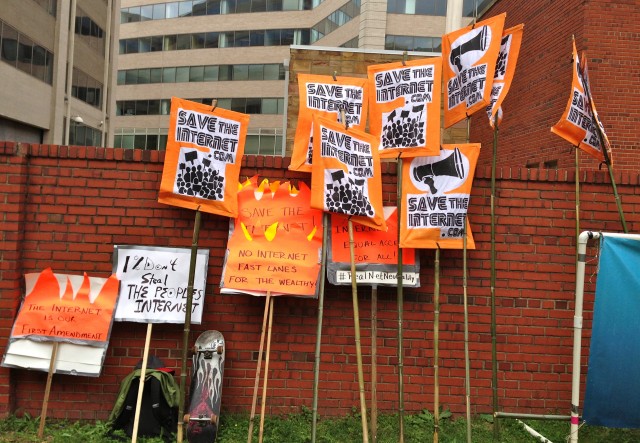
Cable companies that stand to benefit the most from an end to net neutrality have been bankrolling so-called “consumer advocacy” groups that aim to kill it.
Such non-profits like Broadband for America and the American Consumer Institute (ACI), both of which claim to be “independent consumer advocacy groups” and have been fighting against classifying ISPs as a utility (a move that would make it easier to enact net neutrality rules in the future), have been shown to be heavily funded by the cable industry.
According to a disclosure obtained by Vice from the National Cable and Telecommunications Association (NCTA), an ISP-supported trade group, most of Broadband for America’s recent $3.5 million budget comes from a $2 million donation from NCTA. Vice further uncovered that, based on its tax return filings, Broadband for America has retained the DCI Group, an "infamous lobbying firm," that Vice argues specializes in building fake consumer interest groups that actually serve corporate interests.
What's more, Vice found that the American Consumer Institute, which similarly opposes reclassification of ISPs, has been bankrolled by an ISP lobby group called Mywireless.com that has been a consistent financial contributor to ACI since 2010.
"This kind of funding has been very common since the beginning of the net neutrality debate," Tim Karr, director of strategy at the advocacy organization Free Press, told Ars on Friday afternoon.
"ACI has a fairly storied reputation for being a press release factory to drum up industry support,” Karr continued. “They are very much in the business of trying to act as a counterweight to the legitimate advocacy groups that have been well organized against cable industry."
What's more, such industry-funded groups can be quite effective if not called out for their conflicts of interest. "The problem that we see is that the media will quote these people without identifying those conflicts," Karr continued. "They have been very good at infiltrating grassroots causes without properly disclosing sources of funding."
Turf wars
Executives from Internet service providers like AT&T, Comcast, Verizon, and Cox Communication have signed on to a letter from Broadband for America to the FCC regarding net neutrality rules, reports Vice. This campaign seems to be a response to the grassroots actions of Internet users who have been turning out in droves to rallies in support of maintaining net neutrality.
This isn’t the cable industry’s first attempt to control the line of debate over an important telecommunications issue directly affecting their bottom line. For example, in order to make sure the company wouldn’t be forced to deploy high-speed wired broadband service to all of New Jersey's 8.9 million residents earlier this year, Verizon led an aggressive astroturf campaign whereby it flooded the state Board of Public Utilities with hundreds of identical e-mails purporting to support Verizon's case.
This despite the fact that some Verizon "supporters" had no idea e-mails were sent on their behalf.
reader comments
121